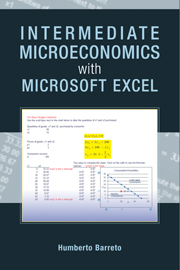Book contents
- Frontmatter
- Contents
- Preface
- User Guide
- Introduction
- PART I THE THEORY OF CONSUMER BEHAVIOR
- 1.1 Budget Constraint
- 1.2 Satisfaction
- 1.3 Optimal Choice
- 1.4 Comparative Statics
- 1.5 Endowment Model
- 1.6 Bads
- 1.7 Search Theory
- 1.8 Behavioral Economics
- PART II THE THEORY OF THE FIRM
- PART III THE MARKET SYSTEM
- Conclusion
- Index
1.8 - Behavioral Economics
from PART I - THE THEORY OF CONSUMER BEHAVIOR
Published online by Cambridge University Press: 05 June 2012
- Frontmatter
- Contents
- Preface
- User Guide
- Introduction
- PART I THE THEORY OF CONSUMER BEHAVIOR
- 1.1 Budget Constraint
- 1.2 Satisfaction
- 1.3 Optimal Choice
- 1.4 Comparative Statics
- 1.5 Endowment Model
- 1.6 Bads
- 1.7 Search Theory
- 1.8 Behavioral Economics
- PART II THE THEORY OF THE FIRM
- PART III THE MARKET SYSTEM
- Conclusion
- Index
Summary
14.127 Behavioral Economics and Finance
This course surveys research which incorporates psychological evidence into economics. Topics include: prospect theory, biases in probabilistic judgment, self-control and mental accounting with implications for consumption and savings, fairness, altruism, and public goods contributions, financial market anomalies and theories, impact of markets, learning, and incentives, and memory, attention, categorization, and the thinking process.
MITOpenCoursewareThe subfield of Behavioral Economics (and Behavioral Finance) is a growing research area that focuses on how decisions are actually made. It is closely tied to psychology and neuroscience. Behavioral economists reject the idea of utility maximization as an assumed black box. Both experimental methods and sophisticated procedures (such as fMRI brain scans) are used to examine how real-world problems are actually solved. A number of results have emerged that challenge the conventional wisdom in mainstream economics.
One area of long-standing interest in psychology involves repeated choice problems. This chapter focuses on a particular kind of repeated choice in which the satisfaction obtained currently depends on past decisions. This is called distributed choice.
Suppose you are deciding whether to watch TV or play a video game. You face this choice repeatedly. The satisfaction gained from watching TV or playing a video game depends on how often that choice has been made in the past. What is the optimal combination of TV and video games over a period of time and, more importantly, how well do people handle this kind of repeated decision?
- Type
- Chapter
- Information
- Intermediate Microeconomics with Microsoft Excel , pp. 249 - 260Publisher: Cambridge University PressPrint publication year: 2009



